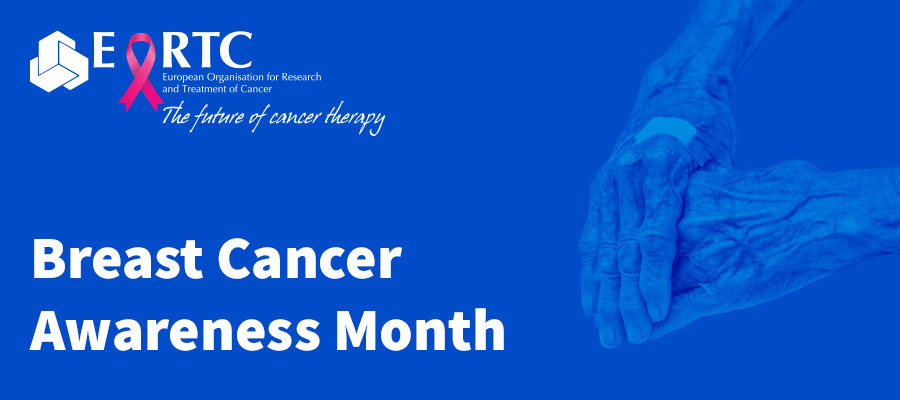Breast cancer in older patients
19 Oct 2017
Breast cancer is an ageing disease. The average age for breast cancer diagnosis is approximately 60 years, and over 40% of all breast cancers diagnosed are in women aged 65 years or older. It is anticipated that, by the year 2030, approximately 20% of the population will be aged over 65 years. In a recent EORTC Elderly Task Force position paper (1), it was stated that the older patients are under-represented in clinical trials evaluating new treatments. As a result it is difficult to reach evidence-based clinical recommendations. The elderly are often disadvantaged as they are undertreated or receive therapies which have not been tested in relevant clinical trials.
EORTC-75111-10114 study is an example on how studies with new therapies can be conducted in the elderly population. The study entitled ‘Pertuzumab and trastuzumab (PH) versus PH plus metronomic chemotherapy (PHM) in the older HER2+ metastatic breast cancer population is an open-label multicentre randomized phase II selection trial of the EORTC Elderly Task Force and Breast Cancer Group.
This 80 patient study attempts to find out if HER-2 targeted regimens with minimal toxicity for the elderly population might delay, or even completely obviate, the use of conventional taxane chemotherapy. Overall survival for patients with HER-2 positive breast cancer is clearly improved with a combination of taxanes and agents that specifically target HER-2. Classical chemotherapy including taxanes, however, is often accompanied with side effects that can adversely affect health related quality of life in the older patients.
The main objectives of EORTC trial 75111-10114 are to evaluate the efficacy as measured by progression free survival at six months following treatment with pertuzumab combined with trastuzumab or pertuzumab combined with trastuzumab plus metronomic chemotherapy in elderly metastatic breast cancer patients. Metronomic chemotherapy uses low doses of chemotherapy drugs so as to minimize toxicity. This EORTC trial included older patients with histologically proven HER-2 positive invasive breast cancer who didn’t receive prior chemotherapy for metastatic disease.
Prof. Hans P.M.W. Wildiers, Universitair Ziekenhuis Leuven – Campus Gasthuisberg, Chair of the EORTC Cancer in the Elderly Task Force, and Coordinator of this study says “With these well tolerated new targeted therapies, we hope to control tumour growth for few years so that toxic chemotherapy can be delayed or even omitted since older patients can also die from other age associated diseases rather than breast cancer.”
The results of the trial will be presented at the San Antonio Breast Cancer Symposium 2017 in December (2) and published soon.
In the management of the older patient, the EORTC Elderly Task Force position paper concludes that future research is needed as there are number of important questions regarding the older cancer patients that remain to be answered.
“Unless heeding the siren’s call and forsaking our evidence-based medicine to the detriment of age, we need to cater for our older breast cancer patients at all levels, including specific clinical research with ambitious phase III”, says Dr Etienne Brain, Chair of the EORTC Breast Cancer Group and a medical oncologist at Institut Curie in Saint-Cloud and Paris. “Given the volume of the older population, feasibility is rarely an issue when the question is fair. Finding financial support remains the main daunting task, especially after regulatory steps and approvals shrinking immediate incentives and interest of companies to dive deeper into action. This underlines the important leverage role of academic groups to make research evolve in the area, addressing these issues much earlier in drug development. That EORTC Breast Cancer Group and Elderly Task Force could work together is a great success, as long as we never forget involving our geriatrician colleagues, without whom no fair research could be conducted in the field”.
Dr. Brain underlines the fact that, “Often, treatments may be the same as in younger patients. However often also, they need adjustments to take into account the high heterogeneity of ageing, making mandatory the investigation and development of adjusted strategies according to frailty”.
This EORTC trial is led by the EORTC Cancer in the Elderly Task force in collaboration with the EORTC Breast Cancer Group and is supported by an educational grant from Roche.
(1)EORTC elderly task force position paper: approach to the older cancer patient. Eur J Cancer. 2010 Jun;46 (9):1502-13. doi: 10.1016/j.ejca.2010.02.022. Epub 2010 Mar 12. Pallis AG, Fortpied C, Wedding U, Van Nes MC, Penninckx B, Ring A, Lacombe D, Monfardini S, Scalliet P, Wildiers H.
(2) Pertuzumab and trastuzumab with or without metronomic chemotherapy for older patients with HER2- positive metastatic breast cancer: Results from the EORTC 75111- 10114 ETF/BCG randomized phase II study; Abstract # 725, Spotlight Session 3, Thursday 7 December 2017, San Antonio Breast Cancer Symposium™, December 5-9, 2017.
Related News
EORTC: Advancing research and treatment for rare cancers
29 Feb 2024
EORTC Fellowship Programme: celebrating more than 20 years of impactful collaboration
22 Feb 2024
Appointment of Malte Peters as EORTC Strategic Alliance Officer
9 Feb 2024
Unique series of workshops in partnership with the European Medicines Agency (EMA)
7 Feb 2024
EORTC launches a prominent clinical trial in older patients with locally advanced (LA) HNSCC (Head and Neck Squamous Cell Carcinoma)
14 Dec 2023
Seven IMMUcan abstracts selected for ESMO Immuno-Oncology Congress 2023
6 Dec 2023
EORTC Quality of Life measures integrated in CDISC
20 Nov 2023
EORTC and Immunocore are collaborating to launch the ATOM clinical trial of tebentafusp in Adjuvant Uveal Melanoma
7 Nov 2023
Treatment with decitabine resulted in a similar survival and fewer adverse events compared with conventional chemotherapy in older fit patients with acute myeloid leukaemia
31 Oct 2023
New results and forthcoming EORTC trials in rare cancers, lung, head and neck, and breast carcinomas presented at ESMO 2023
20 Oct 2023


